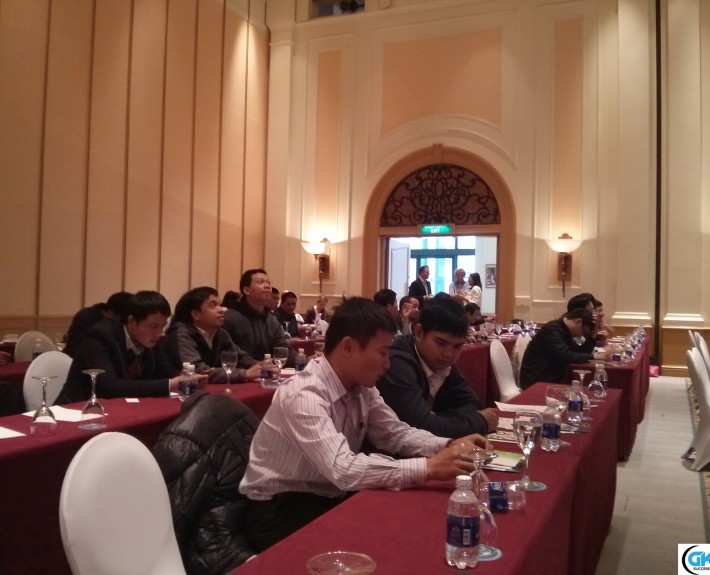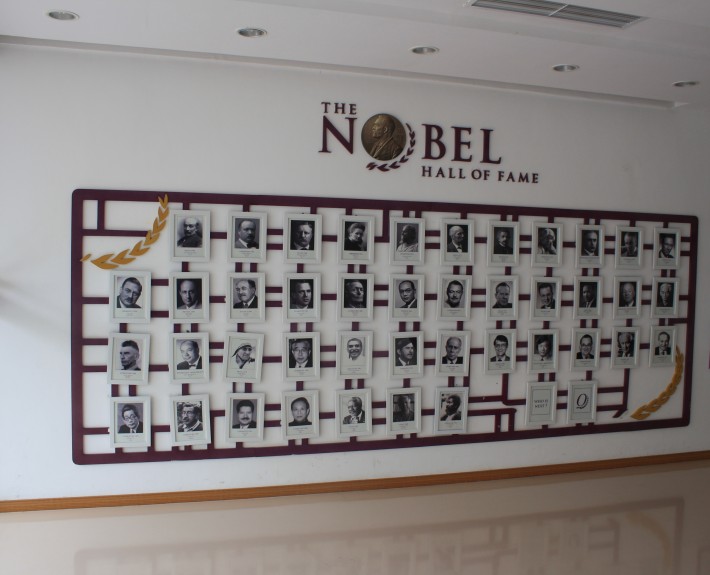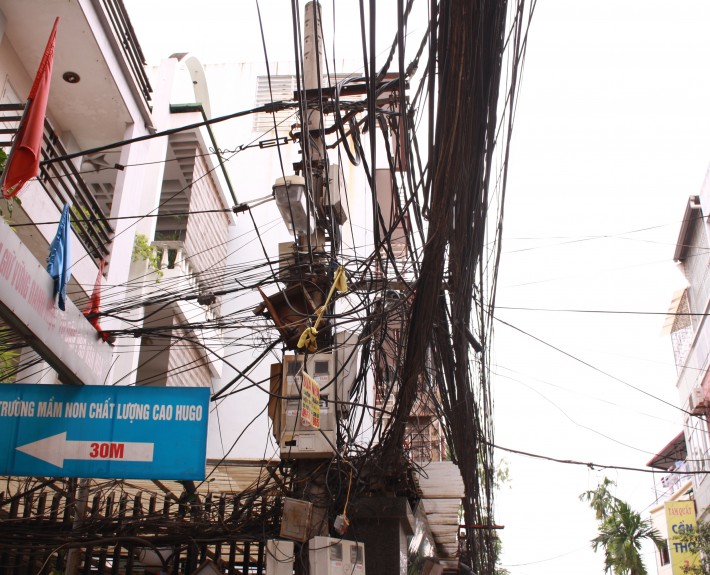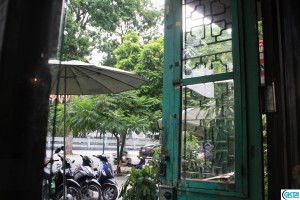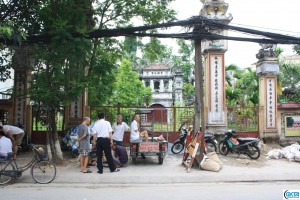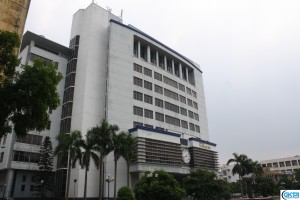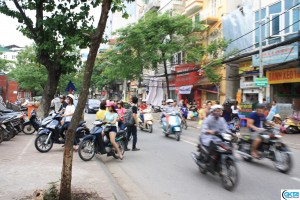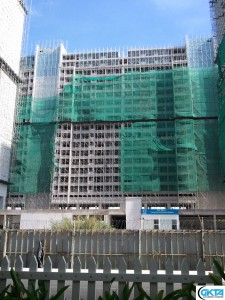-

-
Long Van Group Organizational Structure
-

-
Long Van Group Brands
Long Van Group, founded in 1992, is comprised of four companies: Long Van NTV, Loval, ALV, and Hondalex. Through its portfolio companies based in Vietnam and the US, the family-owned group is perhaps best known for its aluminum product manufacturing—which is how it got its start. The other companies include a trading company in Ho Chi Minh City for the domestic market, a trading company in the US for the international market, and a joint-venture with Hondalex. Recently, we sat down with Thy Van Nguyen (Vanessa), whose official title is Operational Director but she is heavily involved with the strategic vision of the group as well as integral in implementing organizational change across the companies.
Ms. Nguyen was born in Ho Chi Minh City and moved to the US when she was 16. After being based in Seattle, Washington and attending university in the US, Ms. Nguyen moved back to Ho Chi Minh City about 18 months ago in order to focus on the family business. She currently spends about 80% of her time in Vietnam between Ho Chi Minh City and Binh Duong Province, where the manufacturing activities of Long Van Group takes place. Currently, one of Ms. Nguyen’s major initiatives is the transformation of culture in her organization, something that she has successfully done in the domestic trading arm of the group.
Changing a Culture From Within
Ms. Nguyen is a big believer in getting the people doing a task or activity to understand the purpose of it. The people on the front lines are already the best people to do to the job so they will also be in the best position to improve the process. It’s only a matter of getting them used to speaking up and contributing regularly for the reward is improved efficiency and recognition by management and their peers.
That goal is sometimes easier said than done as older managers in a company have a more traditional mindset of top-down management style. Therefore, it’s necessary to first change the managers—either their attitudes or outright replace them (however, Ms. Nguyen didn’t have to fire anybody). If the managers had not bought into her vision at the onset then the project couldn’t have worked. Having the managers on board enabled the culture at the trading company to completely change within eight months but it took six months before she began to see the fruits of her labor. It also helped that Ms. Nguyen speaks Vietnamese in addition to English, and is the daughter of the company’s owner so she did have the power to initiate and implement change. However, despite these advantages it was still tricky for her to balance the right relationship with the workers due to some strong local cultural elements.
Part of the culture in Vietnam revolves around a fear of power which has roots in the royal history of Vietnam and continues in the form of wealth and political power today. Therefore, people in positions of power might need to be more informal, more cheery, and re-emphasize what resources are available to workers who need help, guidance, or any kind of assistance. People aren’t going to ask for help on their own or tell you what problems they have. Vietnamese culture is generally not expressive; a Vietnamese son or daughter can do 1,000 things right and not receive a single compliment. However, if s/he does one thing wrong then they will hear about it to no end. Thus, a lack of a negative response is a positive step. It’s important to praise workers because no one really says compliments from an authority position so it really impacts their subordinates.
It’s interesting to note that Ms. Nguyen was able to effectively change the culture because of gaps in old culture when other senior leaders were focusing on other business lines. Her changes came at the right time because the old system was not effective for expanding beyond the original 20-30 employees since it was largely based on gut feelings.
It may also be that everybody can see the problem at hand but no one wants to do much about it–Ms. Nguyen sought to change that. The interesting thing is that the workers want to hear different perspectives but not necessarily change the old ways of doing things. So even though everyone can point out the problem, no one can suggest a solution because it may be too risky to suggest a potential solution.
This challenge of self-confidence and expression has its origins in the educations system in Vietnam. The educational culture in Vietnam revolves around being told what to do; the teacher tells you the answer and that’s the answer–end of discussion. One way to overcome this element is by tapping into the fact that Vietnamese people love to look good; they want the story to be about them. They love the credit so give them that credit when appropriate. For example, present them with a situation and ask them to help. Then you can follow up with: “I listened to you and it worked.” In these moments you will see how proud the workers are and have just established a precedent. Perhaps the most effective way to connect with workers is to tell them stories, and then get them to be part of the stories. It can be as simple as presenting a scenario to workers and asking them, “if you had to make that decision then what would you do?” Indeed, not all changes are smooth and changing a culture is perhaps one of the toughest tasks to take on but by empowering workers it increases an organization’s operational efficiency overall.
Make no mistake: an organizational transformation is not without friction and conflict—especially when dealing with the “old guard.” Some people quit in the process, in part due to wanting to change the organization in a different way than Ms. Nguyen so they left. Changing the culture required that Ms. Nguyen trust that a real foundation was in place for the company to expand upon itself. To that end, she had to let go of some of the intensive focus she had on certain processes. These days Ms. Nguyen’s 62 workers at the trading company embrace and drive towards her and their vision of change.
Training and Developing Vietnamese Workers
Improvement is a continuous process at Long Van Group. Ms. Nguyen gives training courses once or twice a week for each division in her company in an effort to better prepare them for current and future work-related tasks. She strives to get different workers to select a unit each week based on a set list and give a presentation to the other workers. In her “guide-on-the-side” role, she asks questions and draws opinions from the workers and gives feedback at the end of each session.
During her training sessions, she will also share a story about a work experience, or conduct a workshop, or present a scenario. Then the workers will split into groups and talk about what each worker would have done in the scenario or what to do in the situation in the future.
Example: Your colleague sends an email to an organizational partner who you must coordinate with on a project. In the email, your colleague states that your company is not responsible for a specific portion of scope but that there are related issues that need to be addressed for the client’s benefit. The organizational partner’s vice director simply responds: “If the scope is not your responsibility, then your opinion does not matter.”
Ms. Nguyen will then question the workers on whether or not the logic of the vice director is wrong. Thus, the workers are solving problems with real experiences (the above example is actually used in training by Ms. Nguyen and was experienced by your author in Ho Chi Minh City last year) and are thinking about how to view situations more deeply.
This analysis is important because when responding to allegations some Vietnamese tend to lash out when things start to take a dive and they can take things personally even if they aren’t meant to be from your side. So it’s vital to be mindful of not only what you say (although that is important as well), but about how they feel (and taking care to let everyone save face).
Within Vietnam, southerners rely more on gut feelings whereas northerners are more logical. The southerners present themselves at face value; they want to prove to you that they care about you when they meet you. However, northerners want to compare status levels and act accordingly. Thus, foreigners might have a better time in Hanoi compared to “common people.” Northerners tend to think more before they talk so their use of words is better and more structured which presents them as being clever. Southerners speak more from the heart since they are generally more open and expressive. It’s important to be aware of your counterpart’s feelings because in Vietnam and in life, one can never do something big or grand without building a coalition.
Human Capital in the US and in Vietnam
In the US, people and workers are proactive while in Vietnam they are largely reactive. However, foreigners can learn a lot from Vietnamese people. But first, they must stop assuming and see things in limited possibilities. Ridiculous and downright crazy (from a western perspective) things could and will be possible because it may be the only option for moving forward in Vietnam.
The social structure is more set in the US due to the developed economy and Puritan work ethic. So in the US there is freedom to choose within set choices, i.e., the illusion of freedom because everything is already structured. Life is very predictable in the US so many people want to be proactive, they want to be ahead of the curve. Thus, Americans tend to assume a lot when planning.
On the other hand, Vietnamese are “proactive by being reactive:” they expect the plans to go awry so they bypass the planning stage and when things devolve they are better equipped to salvage the situation. Thus, Vietnamese prepare for certain situations but not for all situations. In that sense, they are able to make unreasonable (or even crazy) positions seem logical because they have developed these skills. They are very adept at framing an arena and taking up defensive and offensive positions and excel when things don’t go right, in part due to the messy social structure. It may be surprising to some that Vietnamese can be very practical because oftentimes there are no other options.
So, Vietnamese are really good at changing situation into their favor but they are also good at making crazy logic sound normal. Some people may believe that if they spot an issue and bring it up, then they will need take responsibility for it. People are afraid of responsibility because of the challenge of getting the task accomplished correctly. Vietnamese people like to look good so they don’t like to put their name on a project or idea in case it fails. But if it turns out good and then they take full credit. For Ms. Nguyen, a large part of the effort to change the organization is by marketing herself through self-branding because the perceptions of the workers will make or break any initiative.
Opportunities for Expats
To Ms. Nguyen, Vietnam is the perfect country to grow something big—but it’s a double-edged sword. Everything is based on relationships, which can be good or bad depending on the perspective. To be successful in Vietnam, one needs to be flexible and open-minded since many problems in Vietnam need to be solved in unorthodox manners. Structure beyond social doesn’t really exist, so if one relies on structure to move forward then s/he is in for a rude awakening (unless those connections are present). Above all, give Vietnam a chance but know where your limits are and what is the extent of your comfort zone for (operational and legal risks).
Expats shouldn’t assume anything in Vietnam and they will have to take on more responsibility to ensure that things stay on track and don’t fall apart. Things that are taken for granted in the west simply don’t exist in Vietnam. For example, the search results of Google, and Google VN are very different. Some people in Vietnam trust the US version more than the Vietnamese version. Also, Vietnamese websites generally don’t have a “how-to” section. For western websites, the product or service offered is described in depth and it is very clearly shown what it is and how it is done.
When explaining something in Vietnam, it has to be simple, clear, and consistently explained multiple times. Then, inverse questions need to be asked in order to triangulate what the actual response is for determining if the receiver understands or not. Communicating processes, requirements, or issues to locals can be timely and frustrating, even when explaining in the Vietnamese language. One way to get Vietnamese people to understand a process or information is through infographics—and in particular, youngsters will understand it better. They like the convenience aspect and the way the information is presented so they are more likely to understand it. If a member of the older generation doesn’t understand something, then s/he will just ask someone nearby or a close friend who will be put on the spot and could just blurt out something that sounds good but isn’t necessarily accurate. Thus, a crazy feedback loop begins where most of the information is wrong as the process continues. Besides, many Vietnamese don’t believe what they read. The older generations do, but the younger (those born in the 1990s and later) ones, no. Cute infographics can help explain things succinctly—and the cuter, the better; think anime characters.
In more general terms, most work fields don’t give newcomers to the country a chance. Connections are part of status which bypasses merit in many cases. It doesn’t matter if you are the best in your field, if you don’t have a good connection then no one will work with you. When arriving in Vietnam, get the connection first. Leverage being sent by a foreign company by learning about the country and forming bonds. Another option is to wait until you have the money to buy status here. In that sense, you don’t have to be the best person in your field—you can be average but still get a piece of the action through connections.
Drinking: Bad or Good for Business?
Still, business can be too much relationship-based; that is to say too reliant on gut feelings and feelings in general. Logic is largely used to make decisions in the US but in Vietnam they need to “feel it” in order to do something. These positive feelings are usually the result of some bonding over alcohol, either bia hoi, ruou, or some imported spirits.
Ms. Nguyen points out that her male employees never get drunk enough to be inappropriate at company functions. And for those who don’t drink any alcohol, while they can sponsor a “drinking nominee,” they could be at a disadvantage with their local counterparts by them not “truly” knowing the person when s/he is drunk. Thus, the best way to establish trust with Vietnamese counterparts is to drink alcohol with them—so if you get drunk easily then you must learn how to control yourself. Vietnamese truly believe that you will be yourself when you are drunk so in a way it’s like peering into your soul.
Everything you say or do shapes their perception about you, especially when drinking. The actual message, while important, is secondary since they are judging you via a gut feeling. It can be quite dangerous since Vietnamese may perceive an offense where there was none. When doing business, Vietnamese generally won’t trust you until you drink alcohol with them and they are able to see the “true you.”
How you are as a person when drunk may be the biggest indicator of doing a deal with Vietnamese. Their perception of you while imbibing will be the baseline for judging you. Once they see you drunk, then that’s how they will perceive you and they will hold onto this image of you until the next time you drink together. If you are a bad drunk, then beware.
The Next Step
Next up for Ms. Nguyen is changing the culture at the factory since it is a special case. The entire production was in the hands of two directors but the current result didn’t turn out so well so the focus is on getting workers to take more initiative and overcome fears of failure. Indeed, Long Van Group is at the forefront of providing high-quality products and driving organizational change in order to provide a better customer experience. Vietnam is becoming an even more prominent destination for outsourcing and manufacturing and as more projects are implemented here then the technical and management skills requirements will increase as well.
Today, China produces for much of the world but in recent years some factories have migrated to Vietnam, in part due to the fact that wages in China are higher than in Vietnam. However, prices of finished goods in Vietnam can be higher than in China because of other operational costs. The disadvantage that Vietnam has is that the workforce is less skilled than China’s and the economies of scale don’t exist on par with China. Quality control remains an issue in Vietnam as well.
As more foreign companies come to the Vietnamese market, the standards for local workers’ qualifications and skills will rise. A growing trend is for Vietnamese workers to take courses at private institutes to aid in their professional development, e.g., how to be a better manager or CEO. These courses are truly development on an individual level because people are there because they want to be better. For the students, Ms. Nguyen suggests that they seek to understand on a conceptual level and learn to connect everything.
“Learning how to connect things is the tool you need to work in the real world,” Ms. Nguyen advises.
Below, Ms. Nguyen shares some of her favorite quotes:
“Do or do not, there is no try.” –Master Yoda
“If you are a good leader, when your work is done, your aim fulfilled, your people will say, ‘We did this ourselves.’” –Abraham Lincoln
“You can listen like a blank wall or like a splendid auditorium where every sound comes back fuller and richer.” – Alice Duer Mill
Special thanks to Vanessa Nguyen of Long Van Group who shared her time with us and greatly contributed to this week’s post.

